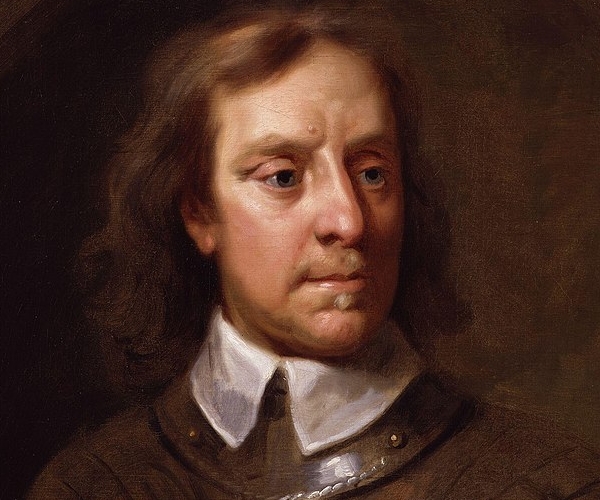Oliver Cromwell
(1599-1658)

Born: 25 April 1599
Place: Huntingdon
Father: Robert Cromwell (c.1560-1617)
Mother: Elizabeth Steward (c.1565-1654)
Spouses: Elizabeth Bourchier (1598-1665)
Children:
Richard Cromwell (1626-1712)
Henry Cromwell (1628-1674)
Robert (1621-1639)
Oliver (1623-1644)
Bridget (1624-1662
Elizabeth (1629-1658)
James (1632)
Mary (1637-1713)
Frances (1638-1720
Religion: Protestant
Died: 3 September 1658
Place: Whitehall, London
Buried: Tyburn, London
Born into the lower ranks of the gentry, Oliver Cromwell rose from being a humble
landowner to the most powerful man in the country following the execution of King Charles I
in 1649. Like many of the gentry, he received a good education, even studying for a time at
Cambridge University, and from a young age was interested in politics. He was the second
son of Elizabeth and Robert Cromwell and was distantly related to the famous statesman of
Henry VIII's reign, Thomas Cromwell.
Cromwell's dramatic rise to power began when he bcame a Member of Parliament for the
city of Cambridge in 1640. In the ensuing rift with the King he sided with Parliament, and by
the outbreak of the Civil War in 1642 was one of the most important Parliamentarians.
During the war he established himself as a military man, helping Parliament to win
significant victories, and in 1645 was appointed Lieutenant General of the New Model Army.
As a deeply religious man, one of history's most famous Puritans, Cromwell truly believed
that he was fighting God's cause. He wanted religious reform, aswell as political, opposing
church hierarchy (i.e. bishops) and paraphernalia. Like many of his time, however, his views
on toleration only extended so far, excluding Catholics, High Anglicans, and some non-
conformists.
Increasingly Parliament looked to Cromwell for leadership as he was, by the end of the Civil
War, its strongest and most charismatic champion. He was amongst those who signed the
death warrant of King Charles I, after the King lost the war, although he did so with sadness
that affairs had come to this. As a courtesy to the monarch's family, he had the King's head
sewn back on so they could mourn and bury him whole.
Following the King's death, Cromwell devoted himself to conquest campaigns in Ireland and
Scotland, campaigns that have left a bitter legacy, before becoming Lord Protector of the
country in 1653. For the next five years, until his death in 1658, he was effectively the
nation's king. In fact, he was even offered the crown but, after much deliberation, refused it.
His rule was not an easy or happy one, however. He had many enemies and was only able to
hold onto power by military force. England was now known as a Commonwealth, but Cromwell was
never able to establish the democratic republic that he dreamt of.
When Cromwell died, his eldest son, Richard Cromwell, became Lord Protector in his stead. However, his rule did not last long. He
lacked the strength and charisma of his father and there was a growing desire in the country
for the return to monarchy. King Charles I's son and heir, Prince Charles, was already King
of Scotland, and in 1660 he successfully reclaimed the English crown. It was the ultimate
victory for the royalists, but it came at a price. Never again was a monarch to have as much
power as the kings and queens of old. In the coming years, Parliament would assume more
and more power, making the monarch a figurehead only.
Without a doubt, Oliver Cromwell is one of the most important political figures in British
history, but his legacy remains controversial. To some, he is a hero of democracy, a
champion of the people, but to others he is a king-killing dictator who ruled through military force.

Main










